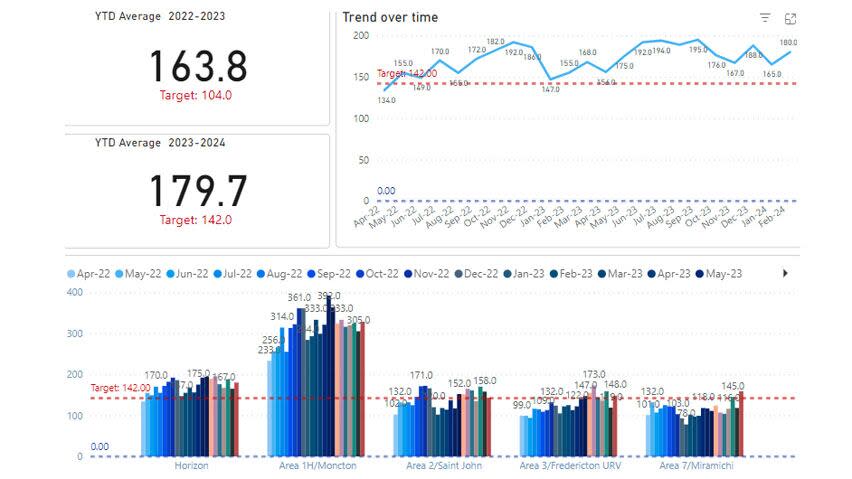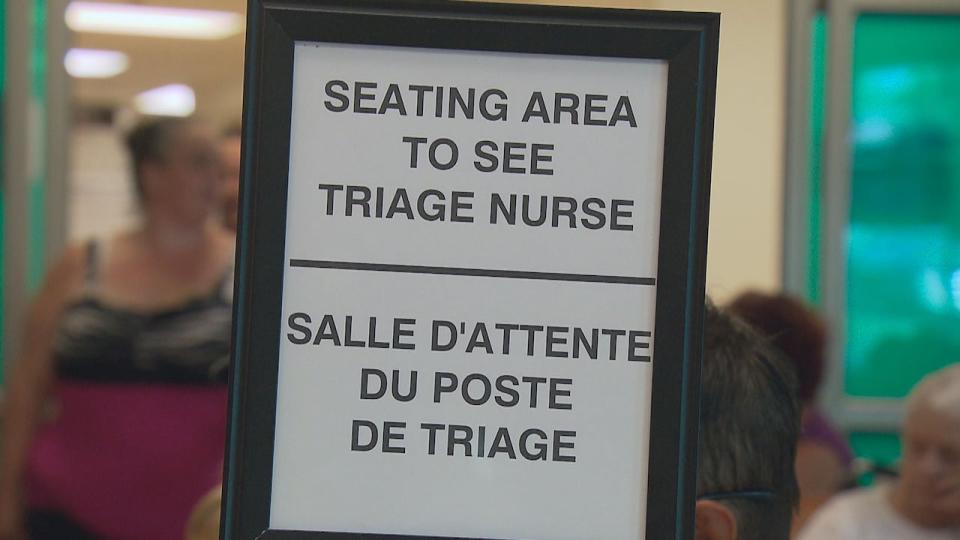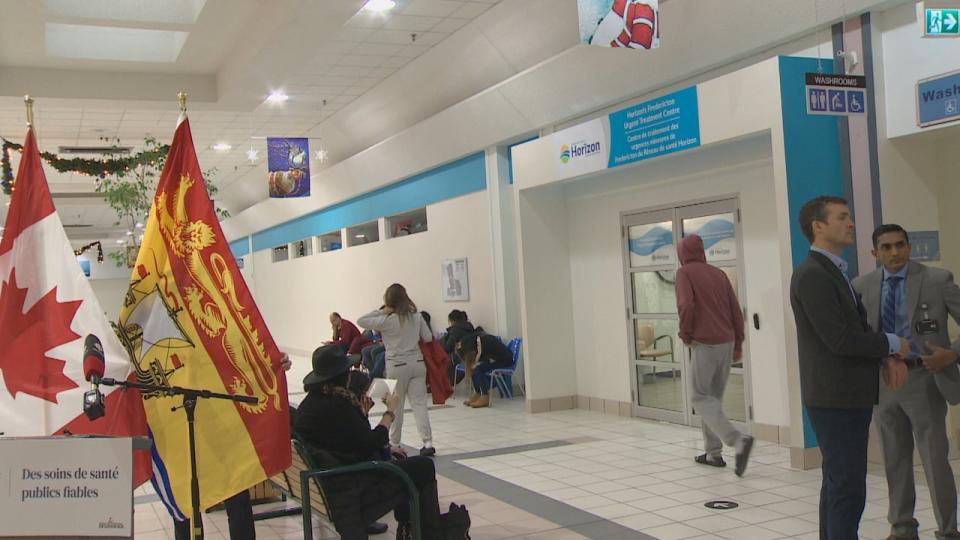Horizon's target for reduced ER wait times is 4 times national guideline

Horizon Health Network is working to reduce emergency department wait times, with a special focus on urgent cases like Darrell Mesheau, who died in 2022 after he waited seven hours to see a doctor at the Fredericton hospital's ER, a coroner's inquest heard earlier this week.
Susan McCarron, clinical director of Horizon's emergency departments in the Fredericton region, testified the goal is to get wait times for patients triaged as being Level 3 down to 120 minutes or less this year.
She did not specify if she was referring to the the Dr. Everett Chalmers Regional Hospital, all Fredericton region hospitals, or all Horizon hospitals — and Horizon did not respond to requests to clarify.
Either way, Horizon's objective is at least four times longer than the national guideline. The Canadian Emergency Department Triage and Acuity Scale calls for Level 3 patients to be seen by a doctor within 30 minutes.
Patients assessed at this level have "conditions that could potentially progress to a serious problem requiring emergency intervention," according to the guidelines.
These can include everything from head injury and chest pain, to asthma and vomiting, the guidelines indicate.

In February, the most recent figures available, the average wait time for Level 3 patients at Horizon regional hospital emergency departments, after being triaged, was 180 minutes, or three hours. (Horizon Health Network)
Level 3 patients "represent most of the patients presenting for care to the emergency department," according to Horizon's performance dashboard.
Horizon spokesperson Kris McDavid told CBC News no one was available for an interview and did not provide any comments about why its target wait time for Level 3 patients is so much longer than the national guideline or how it was set.
According to a trends chart on Horizon's performance dashboard website, the last time Level 3 patients waited an average of 120 minutes to see a doctor, nurse practitioner or physician assistant was more than two years ago.
"Level 3s are the people that quite often get into trouble," registered nurse Neil Gabriel, who has worked at the Chalmers ER since 1998, told the inquest into Mesheau's death.
"Maybe they're sicker than you thought they were," he said.
"Sometimes you're on the fence with them. You can't quite make them a [more serious, "emergent" Level] 2. You know, you might want to, but … anyway, those are the people who can deteriorate."
Mesheau, 78, arrived at the Chalmers ER by ambulance on July 11, 2022, around 9:30 p.m., saying he felt weak and short of breath on exertion.
He was triaged as a Level 3 around 10:45 p.m. and directed to the waiting area, where he was discovered unresponsive the next morning around 4:30 a.m., and was already cool to the touch.
Death prompts inquest, recommendations
His death sparked outrage across the province and prompted a major shakeup of New Brunswick's health-care leadership.
The two-day inquest heard evidence from 10 witnesses and ended with three recommendations from the jury:
Health agencies and government departments "collaborate and show ownership" to resolve the "bed-blockage issue." This refers to when ER patients who have been admitted to hospital have to remain in ER beds because no beds on other units are available, largely because of the number of people waiting in hospital for a long-term care placement, such as a nursing home.
Eight recommendations that stemmed from an internal Horizon review following Mesheau's death, such as having dedicated staff to monitor patients in the waiting room, should also be "fully implemented, funded and staffed."
Staff should be equipped with hand-held electronic devices to record patient vitals.
Daily battle won in minutes
"Probably the thing that we are working on in the emergency department that is most important to us right now — we have a lot of things — but triage Level 3 wait times is our biggest indicator that we are tracking right now," Susan McCarron, the clinical director for Fredericton region ERs, testified.
"We have a project on the go right now where we're monitoring our triage Level 3 numbers," and they are improving, she told the inquest.
In February, the average wait was 230 minutes. said McCarroll, who appeared to be referring specifically to the Chalmers ER. In March, it was 190 minutes.
"This is a battle we fight every day and it's won in minutes," she said.

Darrell Mesheau waited more than an hour at the Chalmers ER just to be triaged, the coroner's inquest into his 2020 death heard earlier this week. (CBC)
The Horizon-wide average wait Level 3 patients faced to be treated by a health-care professional at a regional hospital ER in February — the most recent data available — was about 180 minutes, according to the performance dashboard.
That's up from 165 in January, and up from the year-to-date average of 164 minutes at the same time last year, the website shows.
Patients in the Moncton region, Zone 1, faced the longest waits in February — an average of 328 minutes, or above 5½ hours. No data for individual hospitals is provided.
The Miramichi region, Zone 7, was next highest at 159 minutes, followed by the Fredericton region, Zone 3, at 148 minutes, and Saint John region, Zone 2, at 143 minutes.
The network-wide wait time target for Level 3 patients in 2023-24 was 142 minutes, after triage, the dashboard shows.
The target was set, "based on past performance," it says. No other information is provided.
45% nurse vacancy rate even with travel nurses
McCarron told the inquest Horizon has implemented a number of initiatives since Mesheau's death, which are yielding results.
She cited the hiring of private agency nurses, known as travel nurses, as being key in addressing staffing shortages.
Horizon tells the agency how many nurses it needs, based on its vacancy rate, and what credentials they need to have, she said.
"Our department has been as high as a 65 per cent vacancy rate for staffing. It's better now, around 45, 47 per cent vacancy rate. So it is improving, but it's a work in progress."
Auditor General Paul Martin announced last month he's investigating the management of private agency nursing contracts with Horizon and Vitalité health networks and the departments of health and social development, which are costing taxpayers hundreds of millions of dollars.

Travel nurses have helped fill ER staffing gaps, but Horizon intends to stop using them in August, according to Susan McCarron, clinical director of Horizon's emergency departments in the Fredericton region. (nathaphat/iStock)
A Globe and Mail investigation found agencies such as Toronto-based Canadian Health Labs have charged rates of more than $300 an hour — roughly six times what a local staff nurse earns.
Although Horizon officials have previously said the network planned to stop using travel nurses by the end of March, McCarron told the inquest they will continue to be used until the end of August.
Horizon has "some strategies in place" once the private contracts end, she said.
"Sometimes you can change people's rotations so you can kind of accommodate and get as many people on a shift," said McCarron, noting collective agreements still have to be followed.
We run 24/7, 365 so [staffing] is … always a challenge, even when you're not facing a human resource problem. - Susan McCarron, Horizon clinical director of Fredericton region ERs
Crown prosecutor Chris Titus, who assisted presiding deputy chief coroner Emily Caissy at the inquest, expressed doubts that will be enough.
"I'm going to suggest to you it's more than just juggling schedules if you've got that kind of a vacancy rate," he said.
"Staffing a hospital is very different than running a business, replied McCarron. "We run 24/7, 365 so it is … always a challenge, even when you're not facing a human resource problem.
"It is something, as a manager, I have dealt with since 2012."
Horizon is in the process of hiring people, and is offering a critical care course for new junior hires, she added.
Lone overnight ER doctor
Although some people have expressed concerns about the Chalmers ER being staffed by only one physician overnight, "the problem is the evening," McCarron told the inquest.
"Patients register at certain times of the day and we know when they are — there's a spike at 8 [a.m.], there's a spike at 10 a.m., there's a spike at noon, there's another spike at 4 [p.m.], at 6 [p.m.]

The Chalmers ER is staffed by a single doctor between 1 a.m. and 6 a.m., but McCarron told the inquest only about seven patients register after midnight, on average. (The Canadian Press)
"So we know when the bulk of patients register, and if we can see those patients before midnight, that's how you really fix the night coverage," she said, "because on average, we only register about seven patients after midnight."
Titus noted the triage level of those patients "is another matter though."
"They're often sick," McCarron acknowledged.
'Flow centre,' urgent centre divert lower acuity patients
Diverting lower acuity Level 4 and 5 patients to a "flow centre," which is located next to the Chalmers ER and is staffed by physician assistants and licensed practical nurses, has also helped address wait times, McCarron told the inquest.
"Our physician assistants went from seeing about 300 patients a month to — they can see as many as 750 people now a month," she said.

Horizon hopes to expand the hours of the urgent treatment centre at the Brookside Mall, which currently offers walk-in service Mondays through Wednesdays from 9 a.m. until 5 p.m. (Pat Richard/CBC)
Similarly, the Fredericton Urgent Treatment Centre, which opened at Brookside Mall on the north side in November, has helped divert doctorless patients away from the ER, said McCarron.
She estimates more than 50 per cent of Fredericton residents don't have a family doctor, "and have no where to go, so they often come to the emergency department."
The urgent treatment centre, staffed by an ER doctor as well as nurses and physician assistants, is currently only open three days a week, but Horizon hopes to expand that, she said.

